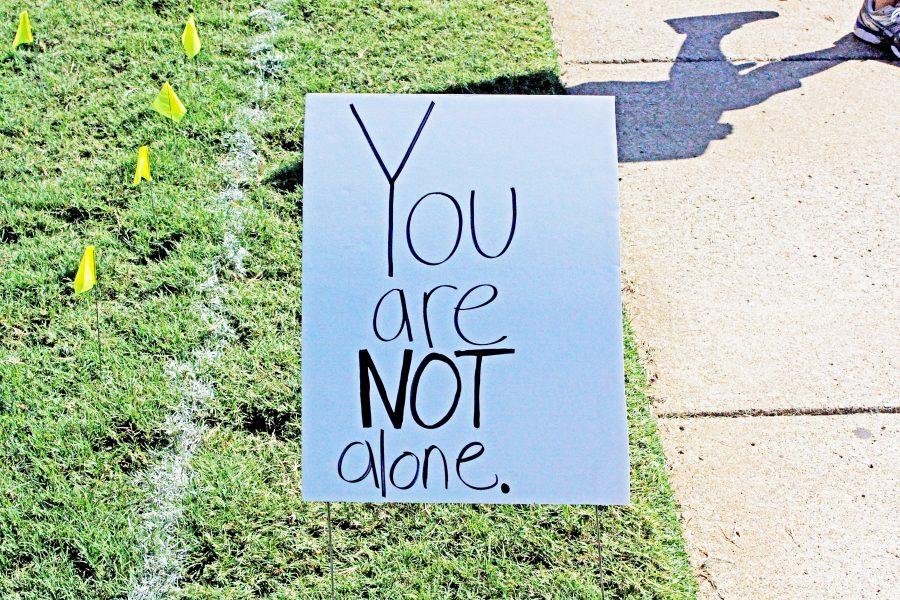Thousands of hours, dollars and teensy balls of tissue paper combine to make the homecoming trek to Bryant-Denny a little more colorful and a lot more electric. This year, instead of puzzling together a bazillion paper balls into a houndstooth fedora or an elephant trunk, Kappa Alpha Theta situated a fractional amount into a purple and turquoise ribbon, calling attention to suicide awareness and prevention.
The sorority turned the rest of their pomp structure into an empty board and invited others to sign the name and share the story of someone lost to suicide. When The Crimson White shared a photo Friday evening, less than 24 hours after the pomp was displayed, it was already full of names signed in bright colors: stark reminders that 42,773 people commit suicide each year.
September is the official month of suicide awareness, and the following first full week of October is Mental Illness Awareness Week. Though these are separate causes and events, they are statistically connected. As part of the week’s resource kit, the National Alliance on Mental Illness reports that suicide is the third leading cause of death in those aged 10-24, and that 90 percent of those who commit suicide have an underlying mental illness. The NAMI-UA chapter and the Student Government Association are working with other services and organizations on campus to increase mental illness visibility, eradicate the stigma, and encourage UA students to seek treatment and aid for themselves or friends.
“It’s just really a lot of people not realizing the intensity and the fact that mental illness doesn’t discriminate,” said Chase Pritchett, vice president of NAMI-UA. “That’s a common thread in people’s stories, when they tell it, they don’t think it can happen to them until they realize, ‘Okay, I have this. This is something that I’m dealing with.’”
Pritchett, a junior majoring in marketing and American studies, has been pleasantly surprised with how receptive the student body has been to other efforts by NAMI to end the stigma surrounding mental illness. He hopes visibility and awareness increase throughout the week.
According to a schedule provided by Caroline Whittington, an SGA director of Mental Health Programs, the week will begin on Monday with an End the Stigma Quad Event, and culminate on Sunday at 2 p.m. with the American Foundation for Suicide Prevention’s Out of Darkness Walk. Throughout the week, there will be a documentary screening, a mental health and resource fair for students to learn about the variety of ways that campus organizations can provide assistance and other workshops that cover topics like mindfulness and managing career anxiety.
“With a lot of people, consistently it’s, ‘Oh, well I didn’t know XYZ existed,’ ” Pritchett said. “Or, ‘I didn’t know this club existed.’ ‘I didn’t really know what the counseling center offered.’ ‘How do I get an appointment with the counseling center?’ ‘I didn’t know that I actually could have this mental illness.’ ‘I thought I was immune.’ ”
In Aug. 2016, NAMI released a college guidebook to mental health, encouraging students to start a conversation. Within, NAMI states that three-quarters of all lifetime mental health conditions begin before age 24, and that 20 percent of youth and young adults experience a mental health condition. Part of eradicating the stigma around mental illness is understanding that students are not alone in their diagnosis. The new stressors of college, NAMI states, can impact mental health; nearly 30 percent of college students reported feeling so low the previous year that it was difficult to function.
Caroline Rose Builta was diagnosed with clinical depression and generalized anxiety disorder when she was 12. Builta, a senior majoring in telecommunication and film, appreciates the generally positive culture surrounding mental illness on Alabama’s campus and thinks that Kappa Alpha Theta’s pomp is indicative of what the campus is moving toward. But while the stigma is lessening around mental illness, particularly depression and generalized anxiety, there is still work to be done for the stigmas around other mental illnesses, like bipolar disorder or schizophrenia, as well as the stigma around prescription drug treatment, she said.
“I cannot overstate the importance of therapy and medication,” Builta said. “I think a lot of people are afraid of prescription medication, but for me, it’s literally saved my life. I notice a difference when I take my medication and when I don’t, so I think that we need to work on overcoming that stigma that we have against prescription medications for anxiety and depression.”
Builta discussed some of her experiences with mental illness in a story titled, “Chemical Angel,” that was published last month in foxletter (thefoxletters.com), a newsletter for college women created by UA junior Natalie Brown. In it, Builta recounts her experience being hospitalized at the end of her freshman year of college, after she had a nervous breakdown.
“It was the best week of my life up until that point,” she said in the story, and also said that it was the first time she didn’t feel depressed since she was 12 years old. She also touches on the stigma surrounding medication.
“When someone is chronically ill, you treat them,” she wrote. “You would never say to someone with strep throat, ‘Don’t take your antibiotics! Just go outside and get some sunshine and you’ll feel better.’”
NAMI-UA’s secretary, Helmi Henkin, is trained to be a support group facilitator for NAMI, and acts as a liaison for the NAMI Tuscaloosa and Alabama state groups.
“Scientifically, sharing your experiences about mental illness reduces the stigma,” she said. “NAMI has these principles of support, and one of them is, ‘We find strength in sharing our experience,’ and the number one thing is, ‘We see the individual first, not the illness.’ Ending the stigma is NAMI’s thing, and that’s what all of their programming is about: giving this information about mental health, resources, what it’s like living with it, so that people understand and will start conversations about it.”
Henkin is a junior majoring in French and psychology, and hopes to obtain her doctorate in clinical psychology so she can one day help adolescents with mental illness. She was inspired to pursue this after dealing with mental illness herself and losing some high school classmates to suicide.
“No one has a mental illness or self harms and opens up about it as an attention thing. It’s a cry for help, if anything,” Henkin said. “There are negative stereotypes associated with all this stuff, and that’s also what ending the stigma is about. Because if people knew that people like me, who always have a smile on their face, have debilitating symptoms, then they would realize, ‘Oh, wow. I’ve got to look at this differently. I’ve got to be there for others.’ You never know what someone is going through.”







